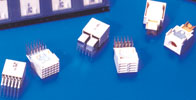Pin-in-paste connectors reduce applied cost
6 October 2004
Interconnection

Designed to be compatible with standard pin-in-paste (PIP) SMT processes, Metral TINT back panel receptacles from FCI eliminate costly secondary assembly operations including heat staking, wave soldering or press fitting.
Available in 4-row (24 position) and 5-row (30 position) sizes, the Metral TINT receptacles are based on the popular standard Metral connector range, conforming to the 2 mm pitch IEC61076-4-104 specification.
PIP process compatible, the receptacles can be reflow soldered in the same operation as smaller active and passive SMT components.
The sharp and symmetrical nature of the receptacle's rigid tail tips and integral location and force retention pegs simplifies mounting.
To take account of the needs of standard pick-and-place machinery, Metral TINT receptacles feature a one piece rigid plastic housing that not only offers a large usable target area to a vacuum nozzle, but which also presents a front and rear surface for the use of mechanical grippers. Unlike smaller SM components, the weight of the receptacle and the complexity of its pinout requires its position to be better controlled during soldering. The location and retention pegs of the Metral TINT receptacle have therefore been designed to cope with a mounting force of 20 N, and to keep the connector in place after mounting and before soldering with a force of 5 N. In most cases, the locating pegs and the large diameter, round section solder tails of the receptacle are sufficient to carry handling, mating and unmating forces.
Certain product designs do, however, require additional retention force. FCI's PIP compatible receptacle therefore offers the option of a hold down feature plate for soldering to a corresponding pad on the board.
Further reading:
Understanding and controlling impedance in high-speed interconnects
Spectrum Concepts
Interconnection
[Sponsored] As data rates move well into the hundreds of gigabits per second, success increasingly depends on an invisible but critical factor: impedance.
Read more...
Low profile spring-loaded connectors
Spectrum Concepts
Interconnection
Mill-Max has announced the introduction of low-profile, surface mount additions to its 2 mm pitch spring-loaded connector range.
Read more...
Prefitted junction box solutions
Interconnection
Prepopulated junction boxes in popular terminal configurations, such as single- and three-phase, enhance convenience for both electrical wholesalers and contractors.
Read more...
Bulgin unveils new range of sustainable connectors
Avnet Abacus
Interconnection
The Standard Vitalis Buccaneer range of waterproof connectors is a bio-based alternative to Bulgin’s flagship series, the Standard Buccaneer, offering the same technical performance with improved sustainability.
Read more...
Possible copper cable crisis looms as global demand soars
Interconnection
With the world requiring up to 3 billion metric tons of copper by 2050 to support green energy transitions and developing nations’ infrastructure, far exceeding the 23 million metric tons mined in 2024, pressure on supply chains is mounting.
Read more...
High-reliability spring-loaded interconnects
Spectrum Concepts
Interconnection
These springs from Mill-Max are drop-in replacements for the standard springs, requiring no changes to the form or fit of the existing spring-loaded pins.
Read more...
Anoison PCB mount connectors for high-performance applications
Conical Technologies
Interconnection
With its wide selection, Anoison provides PCB mount connectors that combine precision, durability, and cost-effectiveness across industries.
Read more...
Connectors for the Smart Factory
Spectrum Concepts
Interconnection
[Sponsored] Designing networks for the smart factory can seem daunting, but the solutions are already available with Samtec providing a comprehensive range of interconnect technologies tailored to the demands of the modern factory.
Read more...
Mouser shares expert design solutions for advanced robotics development
Interconnection
Mouser Electronics has announced a new interactive eBook, ‘The Electric Workforce’, in collaboration with electronics manufacturer and connectivity innovator, Molex.
Read more...
Explosive zone connectors
Interconnection
The connector series design by Glenair is optimised for fast and easy crimp-contact wire termination, with ample wiring space in the cable housing and accessory hardware.
Read more...


